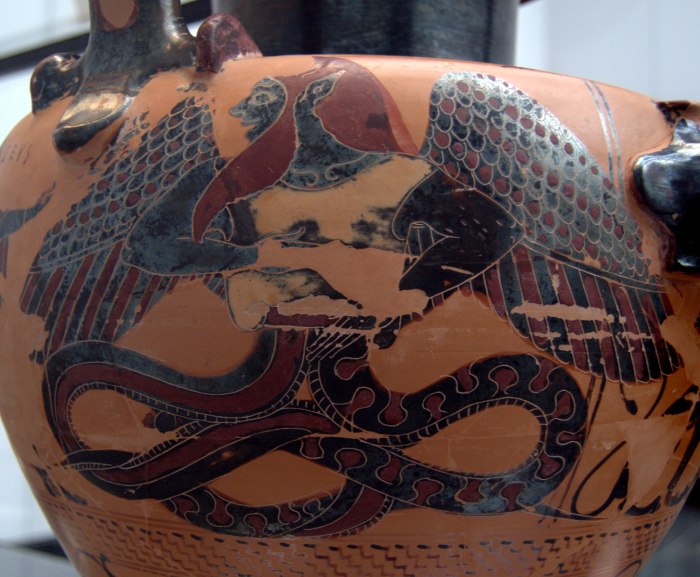Where Zeus trapped the monster crossword delves into the captivating realm of Greek mythology, exploring the enigmatic tale of a formidable monster ensnared by the king of the gods, Zeus. This narrative intertwines the significance of monsters and the indomitable power of Zeus, painting a vivid tapestry of mythological intrigue.
As the narrative unfolds, we embark on a journey to uncover the identity of the enigmatic monster, the cunning methods employed by Zeus to capture it, and the profound consequences that ripple through the mythological realm and beyond. Prepare to be captivated by this timeless tale of divine power and monstrous entrapment.
Greek Mythology Reference: Where Zeus Trapped The Monster Crossword

In Greek mythology, Zeus was the king of the gods and the ruler of Mount Olympus. He was known for his power, strength, and authority, and was often depicted as a bearded man with a thunderbolt in his hand.
Monsters played a significant role in Greek mythology, representing the forces of chaos and disorder that threatened the established order of the gods and the world. They often possessed immense strength, cunning, and destructive power, and were frequently associated with specific locations or events.
Location of Zeus’s Trap, Where zeus trapped the monster crossword
According to the myth, Zeus trapped the monster in a deep chasm or pit known as Tartarus. Tartarus was located in the underworld, beneath the earth and the sea, and was believed to be a place of eternal darkness and torment.
Tartarus was said to be surrounded by a triple layer of walls made of bronze, and its gates were guarded by the giant Typhon. It was believed that the Titans, the ancient gods who had been defeated by Zeus and the Olympians, were imprisoned in Tartarus, along with other monsters and evil beings.
The Monster’s Identity
The identity of the monster trapped by Zeus is not entirely clear, as there are several different versions of the myth.
- Typhon:One version of the myth states that Zeus trapped Typhon, a monstrous giant with a hundred heads and fiery breath, in Tartarus.
- Python:Another version suggests that Zeus trapped Python, a giant serpent that guarded the oracle at Delphi, in Tartarus.
- The Titans:Some versions of the myth imply that Zeus trapped all of the Titans, the ancient gods who had opposed him, in Tartarus.
Methods of Trapping
Zeus used his immense power and cunning to trap the monster. According to the myth, he used a combination of thunderbolts, lightning, and divine strength to subdue the monster and cast it into Tartarus.
The myth also suggests that Zeus enlisted the help of other gods and heroes to trap the monster. For example, in the case of Typhon, Zeus is said to have called upon the help of his son, Heracles, and the goddess Athena to defeat the giant.
Consequences of the Trapping
The trapping of the monster had far-reaching consequences for the gods, the monster, and the mortal world.
- For the gods:The trapping of the monster established Zeus’s dominance over the other gods and solidified his position as the supreme ruler of Olympus.
- For the monster:The monster was condemned to eternal imprisonment in Tartarus, a place of darkness and suffering.
- For the mortal world:The trapping of the monster removed a significant threat to the world, as it prevented the monster from causing further destruction and chaos.
Cultural Significance
The story of Zeus trapping the monster has had a profound cultural impact, appearing in literature, art, and religion throughout history.
- Literature:The myth has been referenced in numerous works of literature, including Homer’s Iliad and Odyssey, and has inspired countless stories and poems.
- Art:The story has also been depicted in art, with famous works such as Michelangelo’s painting of Zeus battling the Titans and Bernini’s sculpture of Apollo and Daphne.
- Religion:The myth has also had a religious significance, as it has been interpreted as a metaphor for the triumph of good over evil and the power of divine authority.
Key Questions Answered
Who is Zeus in Greek mythology?
Zeus is the king of the gods and the ruler of Mount Olympus. He is known for his power, authority, and his role as the protector of justice and order.
What is the significance of monsters in Greek mythology?
Monsters in Greek mythology represent the forces of chaos and disorder that threaten the established order of the gods and mortals. They often embody the fears and anxieties of the ancient Greeks.
Where did Zeus trap the monster?
The specific location where Zeus trapped the monster is not explicitly mentioned in Greek mythology. However, some scholars believe that he imprisoned the monster in Tartarus, the deepest and darkest abyss of the underworld.